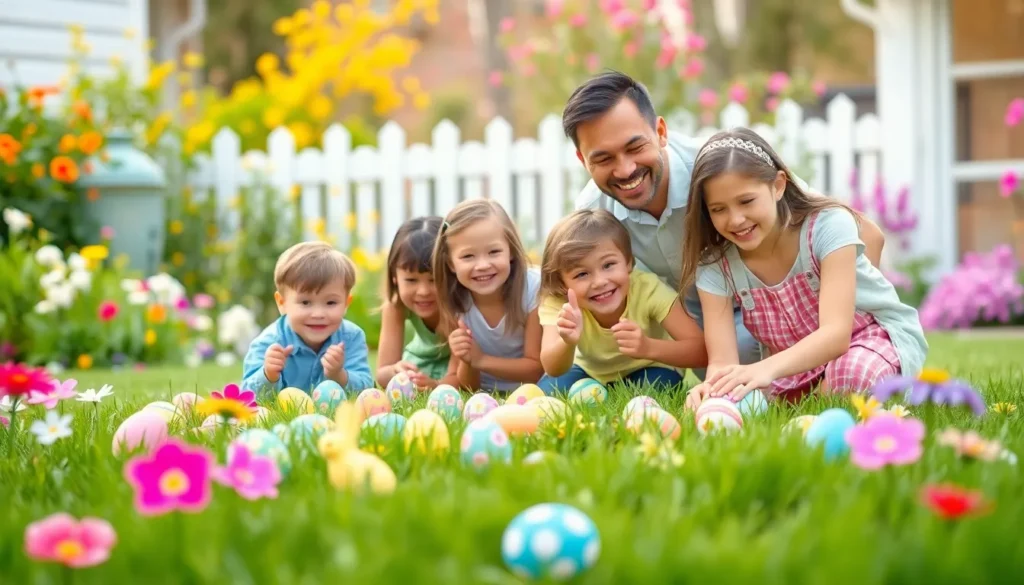Easter isn’t just about chocolate bunnies and egg hunts; it’s a time for families to come together and create lasting memories. As spring blossoms, families everywhere embrace unique traditions that bring joy, laughter, and maybe a little friendly competition. From dyeing eggs that look more like modern art than breakfast food to the thrilling race for the best-hidden chocolate stash, Easter traditions offer a delightful mix of fun and chaos.
Table of Contents
ToggleImportance Of Easter Family Traditions
Easter family traditions hold significant value for social and emotional bonding. They create lasting memories that enhance familial connections. Engaging in activities such as dyeing eggs fosters creativity and teamwork among family members. Participating in egg hunts not only brings excitement but also encourages a spirit of friendly competition.
Traditions often vary from one family to another, reflecting unique cultural backgrounds and values. Personalizing these behaviors makes family gatherings more meaningful. Families often share stories and experiences associated with each tradition, reinforcing their identity and connection. The act of coming together during Easter strengthens bonds among relatives.
Participation in these rituals promotes continuity, allowing younger generations to appreciate their heritage. Children look forward to these experiences, fostering a sense of anticipation and belonging. Traditions associated with Easter often bridge the gap between generations, instilling shared values and family pride.
Creating and maintaining rituals also provides an opportunity for teaching moments. Parents can use these experiences to impart life lessons about kindness, sharing, and gratitude. Ultimately, these traditions contribute to a unified family culture that endures through the years. Each activity enriches the family’s narrative, enhancing their collective history.
Emphasizing Easter family traditions not only cultivates joy but also nurtures the spirit of togetherness. By prioritizing these shared experiences, families create a legacy of love, celebration, and connection that continues to flourish.
Common Easter Family Traditions

Easter traditions foster family bonding and create cherished memories. Families often engage in various activities that reflect their unique values and cultural backgrounds.
Easter Egg Hunts
Easter egg hunts excite children and adults alike. Families hide colorful eggs filled with treats in their yards or homes. Participants race to find the most eggs, turning this event into a lively, competitive affair. Egg hunts encourage teamwork as family members assist younger children in their search. This spirited activity not only promotes physical activity but also builds excitement, making it a highlight of the holiday.
Decorating Easter Eggs
Decorating Easter eggs engages creativity and collaboration among family members. Various techniques, such as dyeing and painting, allow each person to express their artistic flair. Families often gather around tables equipped with supplies to design vibrant, unique creations. Sharing tips and techniques enhances the experience, fostering a sense of togetherness. These beautifully decorated eggs can become cherished keepsakes, linking family members through shared experiences.
Family Gatherings
Family gatherings during Easter provide a chance to reconnect and celebrate traditions. Many families prepare festive meals, featuring dishes that reflect cultural heritage. Decorations and themed activities enhance the festive atmosphere, making gatherings visually appealing. Sharing stories and laughter deepens connections among family members. These moments cultivate a sense of belonging and reinforce the importance of family ties, creating lasting memories for generations to come.
Unique Easter Family Traditions Around The World
Easter family traditions vary significantly across cultures, highlighting unique customs that enrich the holiday experience. Various countries celebrate this time with their distinct practices.
Country-Specific Customs
In Australia, families enjoy the Easter Bilby instead of the Easter Bunny, promoting awareness of endangered species. Greeks partake in midnight church services followed by feasting on lamb, symbolizing rebirth. Meanwhile, in Sweden, children dress as Easter witches, exchanging drawings for candy in a lively tradition. In Germany, families participate in Easter bonfires, symbolizing the arrival of spring. Each of these customs reflects cultural values, enhancing connections among family members.
Traditional Foods
Traditional foods play a crucial role in Easter celebrations worldwide. In Italy, families savor Colomba di Pasqua, a dove-shaped cake symbolizing peace. Families in Poland prepare Święconka, a basket of blessed traditional foods that includes sausage and eggs. In the UK, Hot Cross Buns are a staple, enjoyed for their spicy flavors and cross symbolizing the crucifixion. Similarly, in the United States, ham often graces tables during Easter meals, representing abundance and hospitality. These dishes not just nourish, but also bring families together during festive gatherings.
Creating Your Own Easter Family Traditions
Engaging in Easter family traditions fosters creativity and connection. Families can start by incorporating unique activities that resonate with their cultural heritage. For example, they might create personalized egg-decorating contests that spark competition among family members.
Celebrating Easter meals together enhances the experience. Families often prepare traditional dishes, allowing time for preparation and collaboration. Sharing recipes connects generations, giving younger members insight into their family history.
Organizing an Easter egg hunt remains a popular choice. Creating specific themes makes hunts more exciting and memorable. Another idea involves designing scavenger hunts that require teamwork, which encourages bonding with partners, siblings, or other family members.
Crafting family-centered traditions can also involve storytelling sessions. Sharing family memories brings everyone together and emphasizes the importance of their heritage. Engaging children in these discussions helps them appreciate their roots.
Inviting friends can broaden the celebration. By including neighbors and close friends, families expand their community bonds. This inclusion can lead to shared traditions that evolve over time, enriching everyone’s experience.
Revisiting and adapting past traditions proves beneficial. Reflecting on what works and what doesn’t builds a sense of ownership. Families may find that changing certain aspects breathes new life into their celebrations, keeping them relevant for future generations.
Through shared activities and open communication, families build lasting legacies. Establishing rituals that everyone values nurtures a spirit of togetherness. Recognizing the unique traditions that families create not only strengthens connections but also cultivates joy during the Easter season.
Easter family traditions play a vital role in fostering connection and creating cherished memories. As families come together to engage in activities like egg decorating and festive meals, they strengthen their bonds and celebrate their unique cultural heritage. These traditions not only bring joy but also allow families to pass down values and stories to younger generations.
By embracing both traditional and personalized practices, families can cultivate a spirit of togetherness that lasts long after the holiday. Whether it’s through lively egg hunts or shared meals, the essence of Easter lies in the love and connection nurtured during this special time. As families continue to innovate and adapt their traditions, they ensure that the joy of Easter remains a vibrant part of their lives for years to come.




